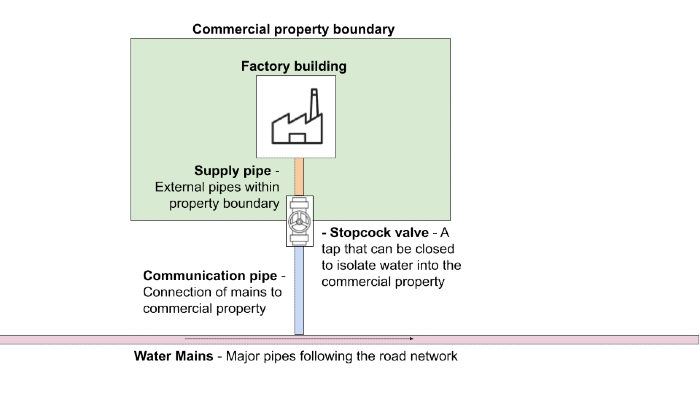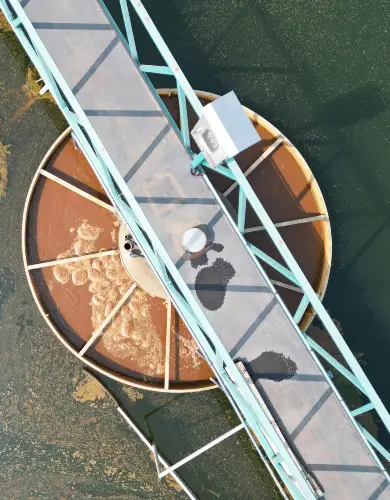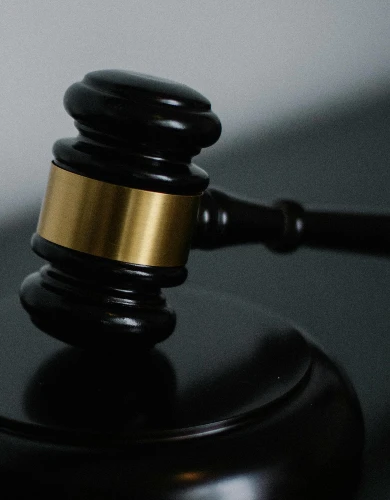Water pipes – who’s responsible?
Water leakage is a significant issue for the British water industry. It is estimated that three billion litres of water are wasted daily across the country.
A key question that frequently arises is who is responsible for fixing leaks in and around private property?
We outline the actions and responsibilities of all parties when leaks occur from water pipes within or near private property.
Responsibility for water pipes
The responsibility for water pipes depends on their location relative to the boundaries of private properties.
Broadly speaking, when an underground pipe is on private property, the local water company is no longer responsible for it.
The diagram below illustrates the typical types of water pipes entering a British property.

Below, we describe and explain the responsibilities associated with each type of water pipe.
Water mains
Description: Large pipes that transport water from treatment plants to local areas.
Responsibility: The local water company (e.g., Thames Water, Scottish Water, etc.) is responsible for maintaining and repairing water mains.
Communication pipe
Description: The pipe that connects the water main to the property boundary.
Responsibility: The local water company is responsible for this section of the pipe up to the stopcock valve at the boundary of a property.
Water meter
Description: A water meter is a device, usually located at the property boundary, that measures water consumption using meter readings.
Responsibility: The local water company is responsible for the maintenance of the meter. Your business water supplier will take regular readings from the meter but is not responsible for its maintenance.
Supply pipe
Description: The pipe running from the stopcock or meter at the property boundary to individual buildings.
Responsibility: The property owner or occupier is responsible, depending on the terms of a lease agreement.
Internal plumbing
Description: All pipework within the building, including taps, water fittings, and boilers.
Responsibility: The property owner or occupier is responsible, depending on the terms of a lease agreement.
Wastewater pipes
Description: Pipes that carry wastewater (e.g., from sinks, baths, toilets) away from the property.
Responsibility:
- Inside property boundary: The property owner or occupier is responsible, depending on the terms of a lease agreement.
- Outside property boundary: The local wastewater company is responsible for maintenance.
Key parties and their roles for your water pipes
Fixing issues with water pipes often requires coordination between several different parties.
In this section, we explain the roles and responsibilities of the various organisations involved in maintaining water pipes.
Local water company
Your local water company is responsible for maintaining the public water infrastructure in your area.
The local water company is also responsible for fixing any leaks that occur outside private property.
Business water supplier
Business water suppliers provide billing and customer support for commercial properties.
If you experience problems with your water meter, contact your supplier’s customer services team. They will arrange repairs with your local water company.
💡 Are you struggling to get in touch with your customer services department? It might be time to switch business water suppliers. Find out how much you could save by using our business water comparison service.
Property owner
Property owners are responsible for all supply pipes and internal plumbing within the boundaries of their property.
Property owners typically hold an insurance policy to cover structural damage caused by burst water pipes.
Property tenant
The responsibilities of a tenant occupying a property depend on the precise wording of their lease agreement.
Typically, a tenant is responsible for the day-to-day plumbing maintenance of water pipes within the property.
Actions in case of a leak
A water leak can result in thousands of pounds in unnecessary water charges and cause structural damage to properties, so promptly addressing any signs of a leak is vital.
Our water experts have prepared a comprehensive step-by-step guide to business water leaks.
Here, we explain the different actions required if you spot a leak either in or around your commercial property.
What do I do when a water leak occurs outside my business property?
If a water leak occurs outside the boundaries of your property, it is not your responsibility to fix it.
However, we strongly recommend contacting your local water company to inform them of the issue.
Ofwat maintains a list of contact details for local water companies.
What do I do when a water leak occurs on my business property?
If you are experiencing a major leak, your first action should be to shut off your property’s stopcock valve to prevent further leakage and property damage.
Shutting the stopcock valve will turn off the water supply to your entire property.
Depending on the size and nature of the leak, it may be necessary to contact a commercial property leak expert who can use pipe detection equipment to locate and repair the leak.
The responsibility for arranging and paying for repairs is typically determined by the lease agreement between the property owner and occupier.

